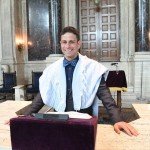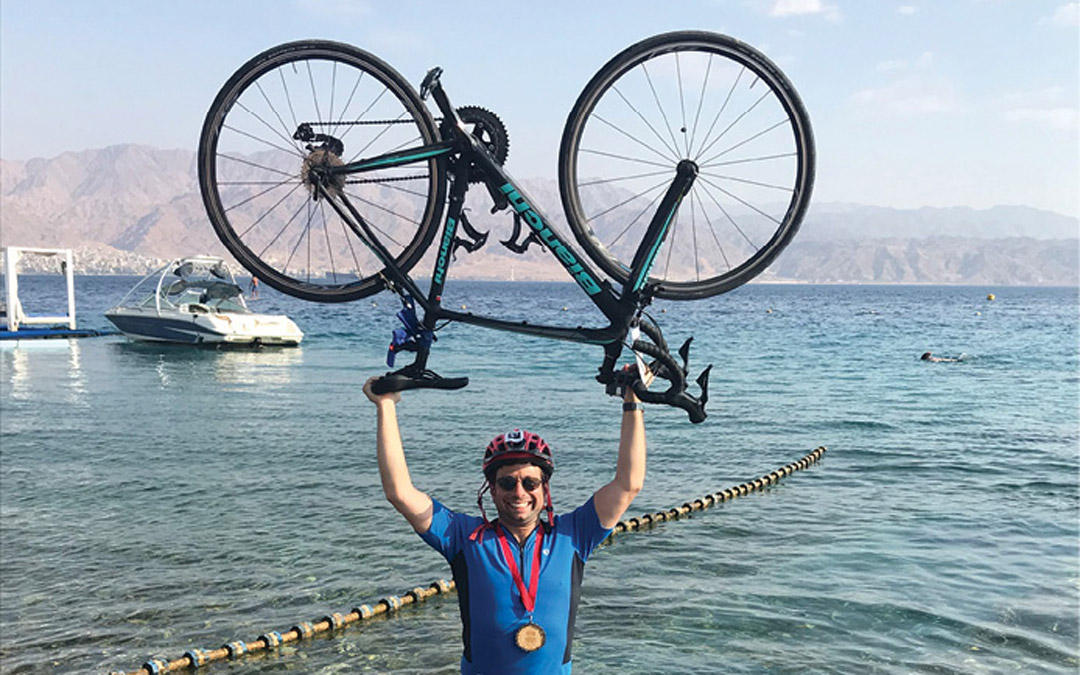A bicycle ride from Jerusalem to Eilat brings Israel and the environment powerfully into focus.
The Torah tells us Adam, the first human, was created from Adamah (ground). Rabbi Arthur Waskow, noticing the pun, calls Adam the “first earthling.” Being “of” the earth is the Bible’s way of telling us we are sacred mud, kinetic sculptures of a divine craftsman, destined not to transcend our earthy origin but to elevate it.
Understanding this, it makes perfect sense the first human being was given a task, a vocation even, to cultivate the very substance from which he was taken: “And YHVH (God) took the human and placed him in the Garden of Eden to work it and safeguard it” (Gen. 2:15). Eleven chapters later when Abraham enters the Promised Land, he’s instructed, “Up, walk about the land, through its length and its breadth” (Gen. 13:17).
Years ago, I served on the board of a Chicago community group whose primary focus was medical access and housing. When we added environmental justice work (lead paint abatement, green construction, etc.) I remember a fellow board member wondering aloud whether sustainability was too “bourgeois.”
Nowadays, we know well the dramatic consequences of climate change and also the unjust ways global warming, air and water pollution, and general human failure to uphold the promise of Genesis, disproportionately affect low-income neighborhoods and communities of color.
At the time of my writing, our Team Beth Am has just returned from the annual Israel Ride, a five-day cycling trip from Jerusalem to Eilat. The ride benefits two wonderful organizations, the Arava Institute for environmental studies in Israel, and Hazon, a Jewish environmental group based in the U.S. What I discovered on the ride was not only the incredible work of these organizations, but something elemental, surprising and deeply human: the power of my own body and its relationship with the land.
A philosophy in the early days of the Zionist Yeshuv was, “Livnot u’lehibanot, to build and to be built” through labor and interaction with the natural environment. When Adam worked the garden, he actualized his own essence. When Abraham roamed throughout the Promised Land, he mapped his natural surroundings. That’s how I felt biking through Israel. I’ve traveled to and throughout Israel many times. I’ve spent two academic years learning in Jerusalem, backpacked as a young man in Tel Aviv and the Galilee, stayed in all kinds of accommodations, including a sweet little house near the Valley of the Cross with my new bride in 2002.
I’ve spent meaningful time with American and Israeli family, visited with Palestinians in Rawabi and Israeli settlers in Tekoa. And I’ve traveled the country by car, train, bus and lots of walking. But to hop on a bicycle in the Jerusalem hills one day … and step off that same bike a week later on the shores of Red Sea was not only a new and unique experience, not only one of the most breathtaking ways to see the land of my ancestors, but it brought a place which, due to its complexity often appears fuzzy, powerfully into focus.
While I was surprised at my ability to ride more than 275 miles and climb 12,000 feet, I was most surprised by how familiar places — a road I had previously taken by bus, a mountain I had hiked as a youth and again with my family a few years ago, Ben Gurion’s grave at S’de Boker — took on new relevance.
This, I think, is the overlooked ingredient of environmental work. Young climate activist Greta Thunberg isn’t simply giving up jet airline travel, she’s become an experienced sailor on the open seas. Eating less meat (produced by an industry that contributes greatly to greenhouse gasses) means exploring new food possibilities. Gardening, planting trees or cleaning up the Jones Falls spillway creates excuses to be outdoors in the fresh air. And not driving from Jerusalem to Eilat means experiencing the journey in a whole new way.
Joni Mitchell tells us, “They paved paradise and put up a parking lot.” Sure, by adding asphalt something is lost. And yes, this is serious stuff: The Earth, which the God of Genesis charged humanity of stewarding, is at serious risk of become less inhabitable. But as the Psalmist tells us, “The heavens are God’s, but the Earth was entrusted to humanity.” This means we’re not only supposed to protect it but also to savor and enjoy it!
So, instead of bemoaning the concrete, steel and asphalt, let’s plant greenery on the roofs, buy fresh local produce under the highway, walk around the city and take to the pavement of country roads, urban cycle tracks or the State of Israel with our bikes.

Rabbi Daniel Cotzin Burg is spiritual leader of Beth Am Synagogue in Reservoir Hill, where he lives with his wife, Rabbi Miriam Cotzin Burg, and their children, Eliyah and Shamir. This column and others also can be found on The Urban Rabbi. Each month in Jmore, Rabbi Burg explores a different facet of The New Jewish Neighborhood, a place where Jewish community is reclaimed and Jewish values reimagined in Baltimore.





